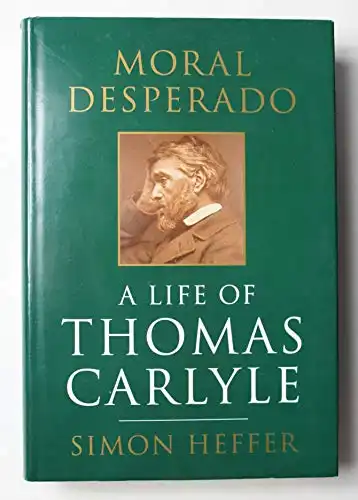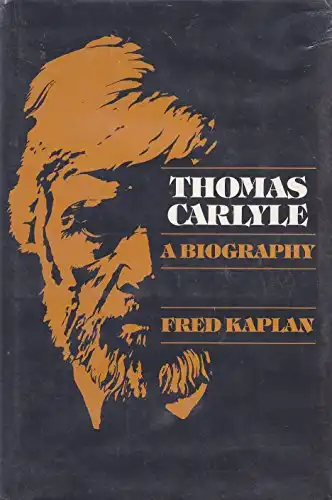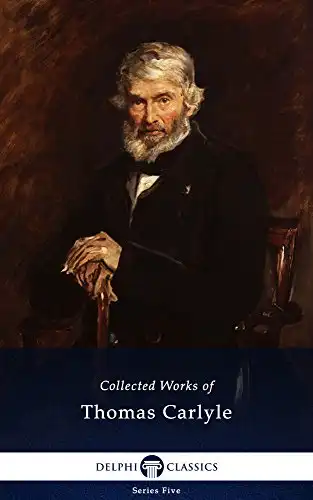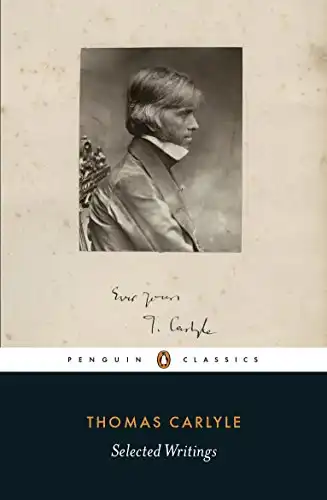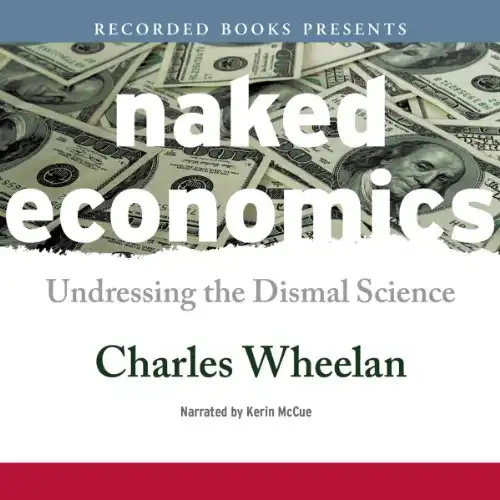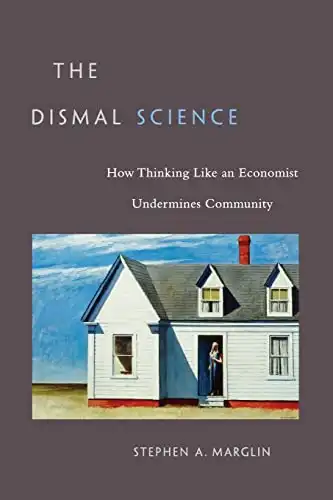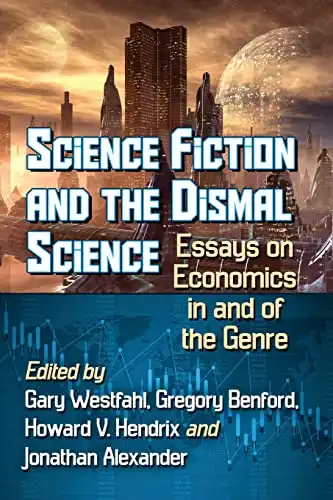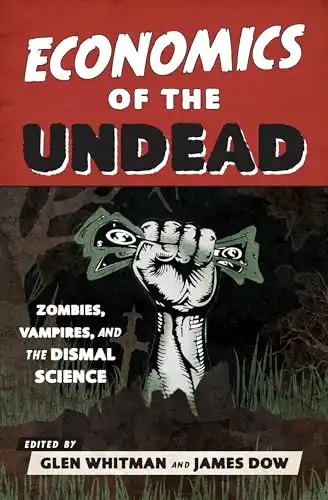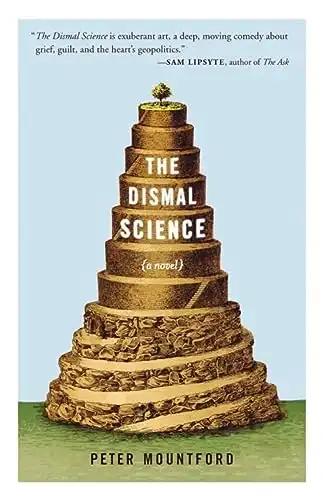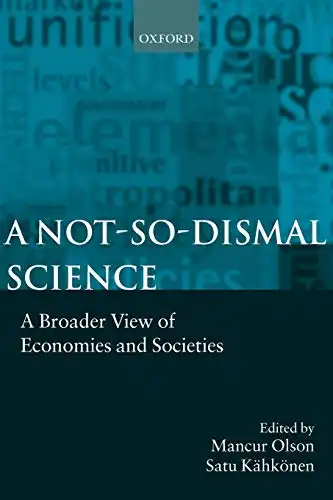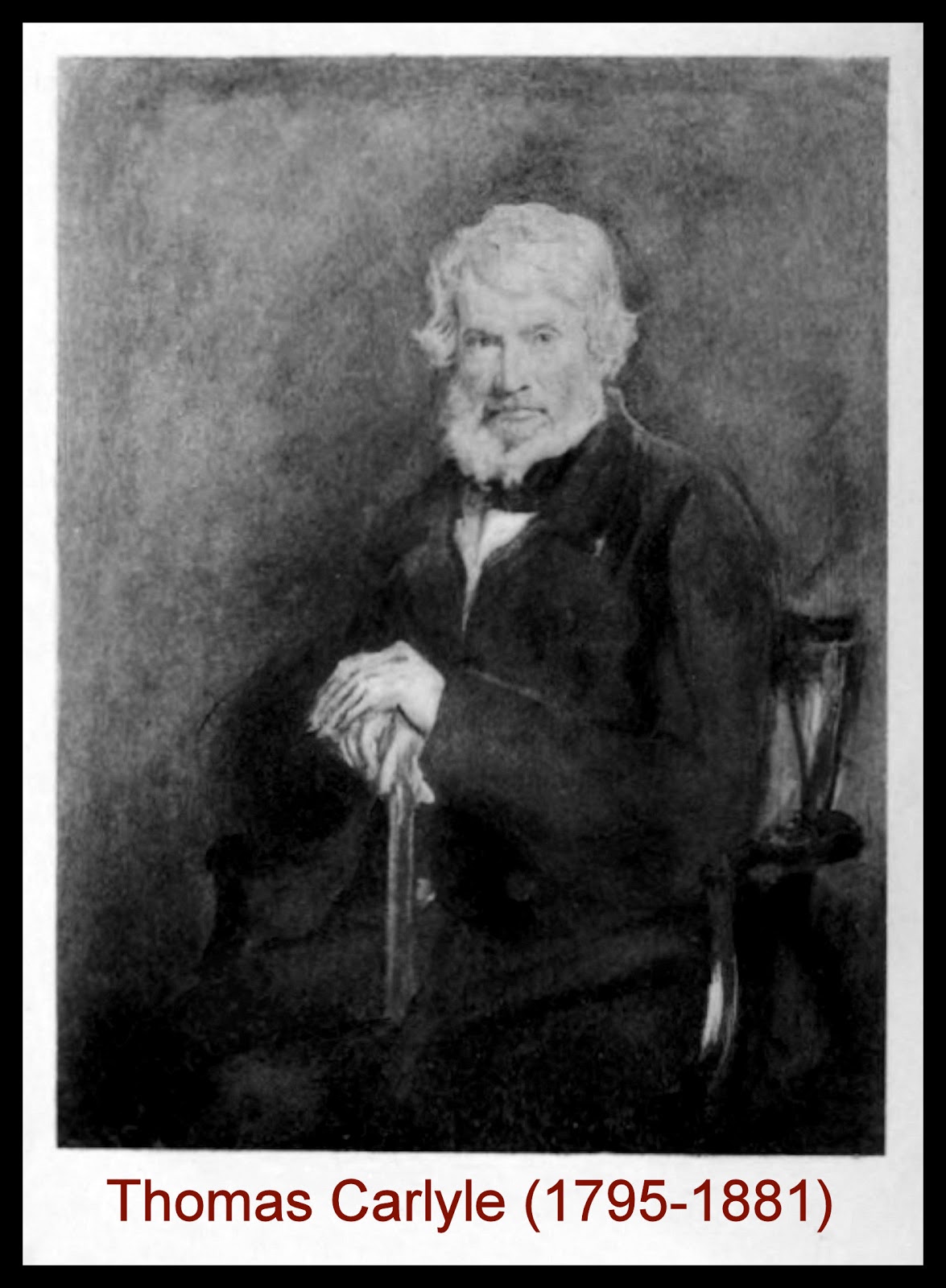
“The Dismal Science” is an old but still commonly-used nickname for the realm of economics.
“Professors of the Dismal Science” is an old but still used nickname for economists.
Both were coined in the mid-1800s by the British historian, translator, essayist, author and mathematician Thomas Carlyle (1795-1881).
I suspect most people who see those terms used in news stories, opinion pieces and books nowadays just think they reflect the view that economics tends to be boring or depressing.
But the story behind their creation by Carlyle is more complex and more distasteful than that.
In a nutshell, Carlyle used the terms to criticize liberal, mid-19th Century social commentators like John Stuart Mill and modern-thinking economists who believed it would be best for society and the economy if people of all races were free from slavery and other forms of forced labor and had certain basic social and economic rights — such as the right to buy or produce and sell products as they saw fit, the right to decide what they wanted to do for work, the right to decide who they were willing to work for, and the right to reject levels of payment for their products or work that they deemed unfair.
Today, those beliefs are generally accepted. But it was a different world when Carlyle created the phrase “the Dismal Science” and dubbed progressive thinkers like Mill “Professors of the Dismal Science.”
Until the mid-1800s, slavery was a foundation of key industries in the UK and other European countries, and in the colonies they exploited in the Caribbean, Africa and elsewhere. It was also a foundation of major agricultural and industrial businesses in the United States, which lagged behind the UK in ending the practice.
The British Parliament outlawed the slave trade in 1807. In the 1830s, Great Britain emancipated the slaves on British islands in the West Indies and in other colonies.
This led to economic impacts that generated significant controversy.
British-owned plantations and industries that had depended on slave labor began going bankrupt. Some freed slaves became paid workers, but the pay was generally low. Many preferred to live off what they could produce from their own small pieces of land or entrepreneurial initiative. But unemployment levels were high among former slaves and most lived in extreme poverty.
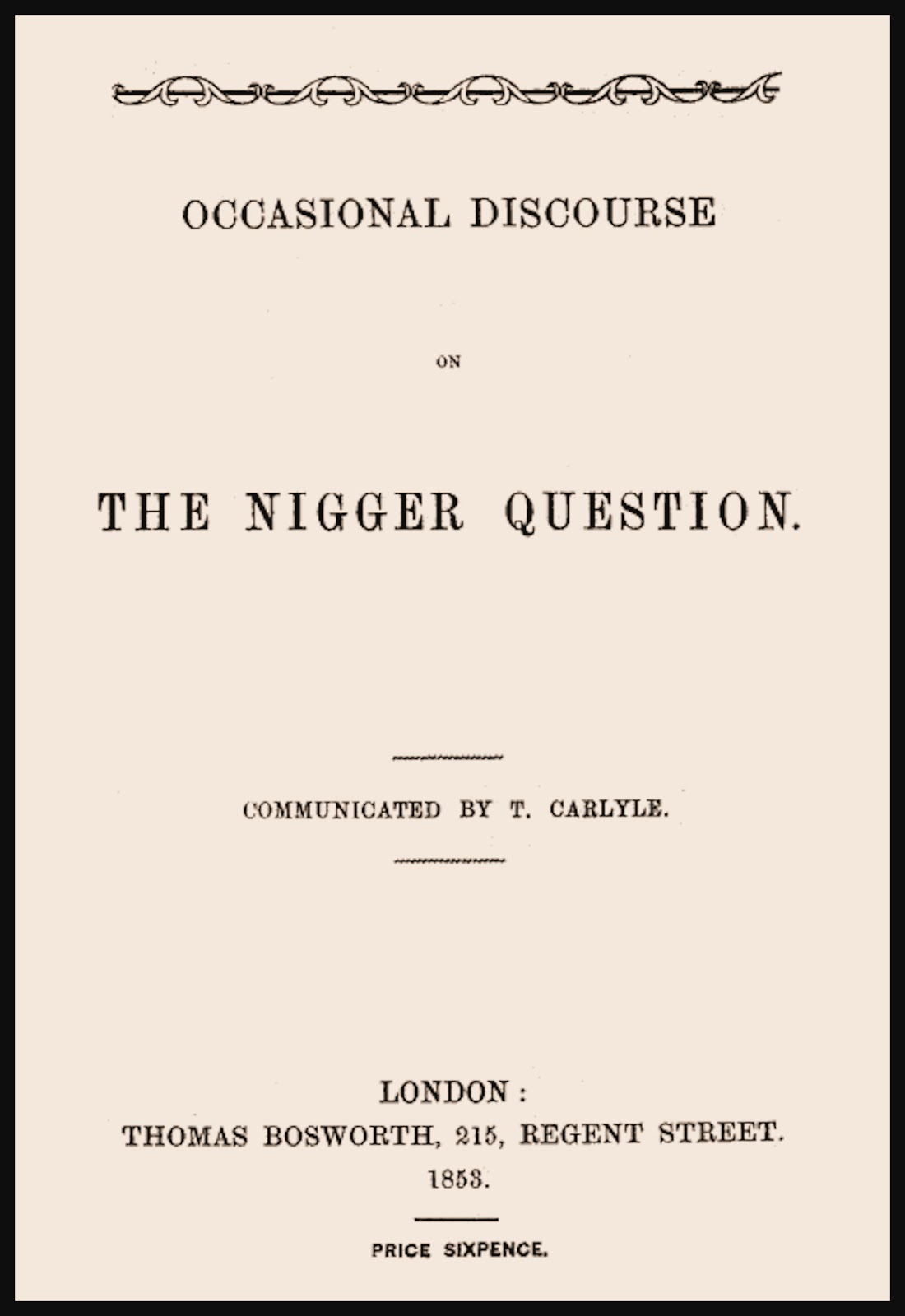 Meanwhile, in 1848, white working class people throughout Europe were pushing back against traditional class-based, aristocratic political systems and unfair exploitation by businesses. A wave of rebellions — now called “the Revolutions of 1848” — swept through dozens of European countries. The goals were greater democracy, better worker rights and wages, and, in some cases Socialism or Communism.
Meanwhile, in 1848, white working class people throughout Europe were pushing back against traditional class-based, aristocratic political systems and unfair exploitation by businesses. A wave of rebellions — now called “the Revolutions of 1848” — swept through dozens of European countries. The goals were greater democracy, better worker rights and wages, and, in some cases Socialism or Communism.
Thomas Carlyle was disturbed by these events and trends and threw scorn at social and economic philosophies and observers that were sympathetic to them.
In 1849 he wrote a now infamous article published anonymously in the December 1849 issue Fraser’s Magazine under the title “Occasional Discourse on the Negro Question.” (It was reprinted in 1853 under the more offensive title “Occasional Discourse on the Nigger Question,” with the attribution “Communicated by T. Carlyle.”)
The piece is written in a satirical, cynical style that Carlyle apparently thought was both humorous and persuasive. The “discourse” it relates (basically a rant) is attributed to an unnamed but clearly white, upper-class speaker.
He mocks his “philanthropic friends” who supported the emancipation of slaves and believed in a laissez faire type commerce amongst free men, governed primarily by supply and demand. He said of those schools of thought:
“…not a ‘gay science,’ but a rueful — which finds the secret of this universe in ‘supply and demand,’ and reduces the duty of human governors to that of letting men alone…no, a dreary, desolate and, indeed, quite abject and distressing one; what we might call, by way of eminence, the Dismal Science.”
He went on to warn that “the Dismal Science, led by any sacred cause of black emancipation…will give birth to progenies and prodigies: dark extensive moon-calves, unnameable abortions, wide-coiled monstrosities, such as the world has not seen hitherto!”
The article in Fraser’s is full of obtuse, outdated language and references. It’s not easy for modern readers to understand. And, it could almost seem like Carlyle was mocking the speaker, not the anti-slavery, free market advocates.
But, in fact, Carlyle was essentially a racist and a supporter of class-based social systems and autocratic governments. He didn’t much like untalented, hereditary aristocrats, but he admired self-made tyrants, dictators and “Captains of Industry.”
In his 1841 book On Heroes and Hero-Worship, he proclaimed that “The history of the world is but the biography of great men.” (The basis for “the Great Man theory” of history.)
Carlyle’s diatribe in the Fraser’s article argues that the recent history of Great Britain’s Caribbean colonies proved that laissez faire economic policies and the emancipation of black slaves were ultimately bad for both whites and blacks.
He suggests that the best course for the West Indies and “civilized” countries in general would be to go back to the “the beneficent whip” and compel the “indolent, two-legged cattle” who were former slaves and other such lesser humans — like the “unsold; unbought, unmarketable Irish” — to work.
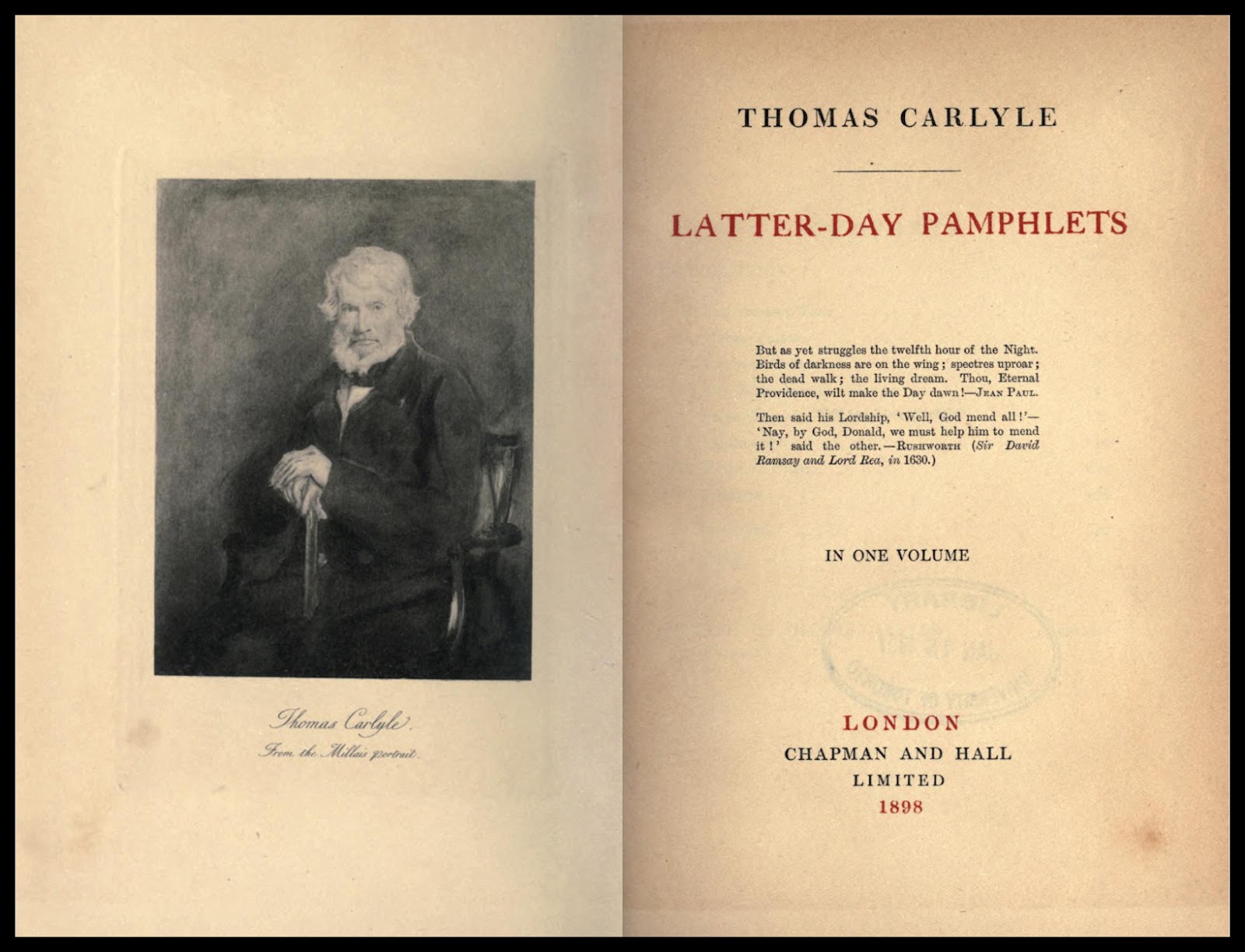 Carlyle coined the phrase “Professors of the Dismal Science” in a series of pamphlets he wrote in 1850 called THE LATTER-DAY PAMPHLETS. It pops up first in Pamphlet No. 1, titled “THE PRESENT TIME” and dated February 1, 1850.
Carlyle coined the phrase “Professors of the Dismal Science” in a series of pamphlets he wrote in 1850 called THE LATTER-DAY PAMPHLETS. It pops up first in Pamphlet No. 1, titled “THE PRESENT TIME” and dated February 1, 1850.
In the opening of that pamphlet, Carlyle outlines some of his basic beliefs. Here are a few examples:
“Historically speaking, I believe there was no Nation that could subsist upon Democracy.”
“I say, it is the everlasting privilege of the foolish to be governed by the wise; to be guided in the right path by those who know it better than they. This is the first ‘right of man;’ compared with which all other rights are as nothing.”
“In all European countries, especially in England, one class of Captains and commanders of men, recognizable as the beginning of a new real and not imaginary ‘Aristocracy,’ has already in some measure developed itself: the Captains of Industry.”
Later in the first pamphlet, Carlyle includes what he portrays as a speech by a British Prime Minister that was aimed at poor, unemployed people; people like the millions in Ireland suffering from the potato famine and “other Beggars, the able-bodied Lackalls, nomadic or stationary, and the general assembly, outdoor and indoor, of the Pauper Populations of these Realms.”
The fictional PM, elucidating what are actually Carlyle’s views, urges these benighted souls to become “Soldiers of Industry.”
Carlyle anticipates that misguided do-gooders will criticize such views and inserts a parenthetical paragraph that includes his first use of “Professors of the Dismal Science.”
“Here arises indescribable uproar, no longer repressible, from all manner of Economists, Emancipationists, Constitutionalists, and miscellaneous Professors of the Dismal Science.”
Carlyle’s imaginary PM scoffs at such people and continues to bloviate. Carlyle apparently viewed what he says as inspiring, though it was not likely to be perceived that way by any impoverished Irish, working class Brits or ex slaves who heard or read it. Near the end, the PM says to them:
“Here is work for you; strike into it with manlike, soldier-like obedience and heartiness, according to the methods here prescribed,—wages follow for you without difficulty; all manner of just remuneration, and at length emancipation itself follows. Refuse to strike into it; shirk the heavy labor, disobey the rules,—I will admonish and endeavor to incite you; if in vain, I will flog you; if still in vain, I will at last shoot you,—and make God’s Earth, and the forlorn-hope in God’s Battle, free of you.”
In that first LATTER-DAY PAMPHLET, Carlyle links but does not limit the term “Professors of the Dismal Science” to economists.
However, over the decades, the term “the Dismal Science” lost its connection to the 19th Century debate over slavery, democracy and economic freedom in common usage.
It simply became a term writers use, usually in a humorous way, to describe economics in general. “Professors of the Dismal Science” became a common humorous description of economists.
Most people who use the terms that way today are unaware of the dismal social, economic and political views behind their creation by Carlyle.
* * * * * * * * * *
Comments? Corrections? Email me or Post them on the Famous Quotations Facebook page.
Related reading, listening and stuff…


